Filter by

Tradition, Transmission, Transformation = Proceedings of Two Conferences on P…
This volume is the outcome of two conferences held at the University of Oklahoma in 1992 and 1993 which dealt with issues of transmission and subsequent cultural transformations that occurred in the premodern histories of mathematics and science. Some twenty contributors explore transmission from a variety of perspectives, including the role of language and other facets of culture in the trans…
- Edition
- -
- ISBN/ISSN
- 9789004625747
- Collation
- 591 hlm; ill., lamp.,
- Series Title
- Collection de Travaux de l'Académie Internationale d'Histoire des Sciences, Volume: 37
- Call Number
- -
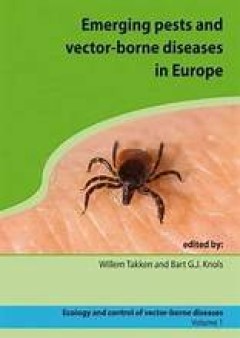
Emerging pests and vector-borne diseases in Europe
"This is a multi-authored book concerning the perceived threat and recorded increase of emerging pests and vector-borne diseases affecting man and animals in Europe. Historically, Europe suffered from numerous pests and vector-borne diseases, including yellow fever, malaria, plague and typhus. Introduction of hygienic measures, drugs and vector control caused the disappearance of many of these …
- Edition
- -
- ISBN/ISSN
- 978-90-8686-626-7
- Collation
- oer.unej.ac.id
- Series Title
- Ecology and Control of Vector-borne Diseases, Volume: 1
- Call Number
- -

Economic Imperatives for Women's Writing in Early Modern Europe
Economic Imperatives for Women’s Writing in Early Modern Europe delves into the early modern history of women’s authorship and literary production in Europe taking a material turn. The case studies included in the volume represent women writers from various European countries and comparatively reflect the nuances of their participation in a burgeoning commercial market for authors while pro…
- Edition
- -
- ISBN/ISSN
- 978-90-04-38302-9
- Collation
- oer.unej.ac.id
- Series Title
- Women Writers in History, Volume: 2
- Call Number
- -

Dynamics in the History of Religions between Asia and Europe Encounters, Not…
This first volume of the series “Dynamics in the History of Religions” reviews the opening conference of the "Käte Hamburger Kolleg” at the Ruhr-University Bochum. The first section concentrates on the formation of what later come to be termed "world religions" through inter-religious contact, the second part focuses on the significance of interreligious contacts also during their expans…
- Edition
- -
- ISBN/ISSN
- 978-90-04-22535-0
- Collation
- oer.unej.ac.id
- Series Title
- Dynamics in the History of Religions, Volume: 1
- Call Number
- -
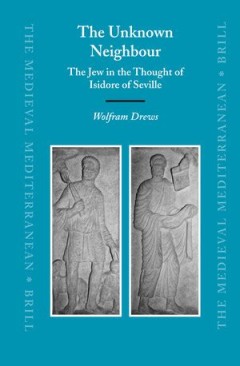
The Unknown Neighbour = The Jew in the Thought of Isidore of Seville
This book provides a detailed analysis of Isidore of Seville's attitude towards Jews and Judaism. Starting out from his anti-Jewish work De fide catholica contra Iudaeos, the author puts Isidore's argument into the context of his entire literary production. Furthermore, he explores the place of Isidore's thinking within the contemporary situation of Visigothic Spain, investigating the political…
- Edition
- -
- ISBN/ISSN
- 9789047408925
- Collation
- -
- Series Title
- The Medieval Mediterranean, Volume: 59
- Call Number
- -

The Twentieth Century in European Memory = Transcultural Mediation and Reception
The Twentieth Century in European Memory investigates contested and divisive memories of conflicts, world wars, dictatorship, genocide and mass killing. Focusing on the questions of transculturality and reception, the book looks at the ways in which such memories are being shared, debated and received by museum workers, artists, politicians and general audiences. Due to amplified mobility and c…
- Edition
- -
- ISBN/ISSN
- 9789004352353
- Collation
- 364 hlm; ill., lamp.,
- Series Title
- European Studies, Volume: 34 European Studies, Volume: 34
- Call Number
- -
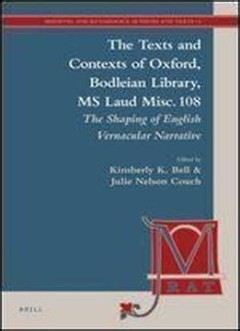
The Texts and Contexts of Oxford, Bodleian Library, MS Laud Misc. 108 = The S…
The late thirteenth-century, monolingual Oxford manuscript, Bodleian Library, MS Laud Misc. 108, bears singular importance to medieval studies, for it preserves and anthologizes unique versions of several seminal Middle English texts, including South English Legendary, Havelok the Dane, and King Horn and Somer Soneday. While critics have traditionally classified these poems by genre, this book …
- Edition
- -
- ISBN/ISSN
- 9789004192249
- Collation
- 368 hlm; ill., lamp.,
- Series Title
- Medieval and Renaissance Authors and Texts, Volume: 6
- Call Number
- -
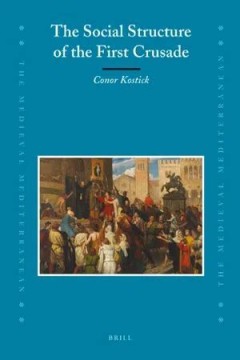
The Social Structure of the First Crusade
The First Crusade (1096 – 1099) was an extraordinary undertaking. Because the repercussions of that expedition have rippled on down the centuries, there has been an enormous literature on the subject. Yet, unlike so many other areas of medieval history, until now the First Crusade has failed to attract the attention of historians interested in social dynamics. This book is the first to examin…
- Edition
- -
- ISBN/ISSN
- 9789047445029
- Collation
- 336 hlm; ill., lamp.,
- Series Title
- The Medieval Mediterranean, Volume: 76
- Call Number
- -
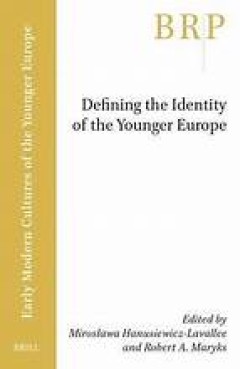
Defining the Identity of the Younger Europe
Defining the Identity of the Younger Europe gathers studies that shed new light on the rich tapestry of early modern “Younger Europe” — Byzantine-Slavic and Scandinavian territories. It unearths the multi-dimensional aspects of the period, revealing the formation and transformation of nations that shared common threads, the establishment of political systems, and the enduring legacies of …
- Edition
- -
- ISBN/ISSN
- 978-90-04-54727-8
- Collation
- oer.unej.ac.id
- Series Title
- Brill Research Perspectives in Humanities and Social Sciences Brill Research Perspectives in Early Modern Cultures of the Younger Europe
- Call Number
- -

The Depth and Size of the European Union in a Time of War: Interdisciplinary …
"This book makes a timely and unique contribution to the field of European Union studies drawing on interdisciplinary insights from economics, law and political science to shed light on crucial questions relating to the depth and size of the EU in times of war, including enlargement, migration, citizenship, and new technologies. The broad scope of the book will be highly useful for scholars, pr…
- Edition
- -
- ISBN/ISSN
- 978-3-031-83441-7
- Collation
- XIII, 278
- Series Title
- -
- Call Number
- -
 Computer Science, Information & General Works
Computer Science, Information & General Works  Philosophy & Psychology
Philosophy & Psychology  Religion
Religion  Social Sciences
Social Sciences  Language
Language  Pure Science
Pure Science  Applied Sciences
Applied Sciences  Art & Recreation
Art & Recreation  Literature
Literature  History & Geography
History & Geography